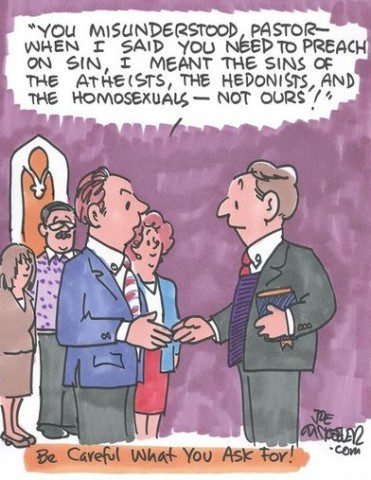
Over the weekend, A Christian man by the name of John sent me the following email. My response is indented and italicized. All spelling and grammar in the original.
After reading about your “mind reading ability” and your becoming a non-believer I wonder what changed you.
I have no idea what John is talking about when it comes to “mind reading ability.” I was unable to find a log reference for John’s IP address — an oddity, to be sure — so I don’t know what he read on this site. I suspect he didn’t read any of my autobiographical writing. Had John shown a bit of curiosity, he would have found the WHY? page. The posts listed on this page would have answered most, if not all, of John’s questions about “what changed me.”
I knew Father Jack Baker for years and I have zero doubt he was wrongfully convicted by an extremely woke, political attorney general.
Joseph “Jack” Baker is a Roman Catholic priest who was convicted last year on sexual assault charges and sentenced to 4-15 years in prison. He was convicted by a jury of his peers. Were they all “woke?” Does John really expect anyone to believe that Baker is innocent; that he was convicted because a “woke” attorney general was out to get him? Baker was convicted of sexually assaulting a child under the age of thirteen. In other words, he is a pedophile.
Baker actually got off easy. As I wrote at the time: “Baker was given a lighter sentence because of all the “good” things he did as a pastor. Does anyone seriously think that this was the only time that Baker took advantage of a church minor? I mean, really? As has been shown in countless Black Collar Crime stories, judges often give offending clergy what I call the “preacher’s discount,” sentencing them to lighter sentences than non-clerics receive. Lost on judges is the fact that these men abused the trust their victims had in them, causing untold physical and psychological harm. They should be punished to the fullest extent of the law.”
John says he knows Baker. Unfortunately, not well enough to know that he was a child molester. None of us knows people as well as we think we do; even our spouses, children, and best friends. We all have secrets. Baker’s “secret” landed him in prison.
The bible warns in the end times even the elect will be deceived. I wish no contact with you except to plead that you look into the world-wide drive toward woke and the perversion of over 2,000 years of Christian beliefs.
The Bible does not say that in the end times the “elect” will be deceived. Matthew 24:24 says: For there shall arise false Christs, and false prophets, and shall shew great signs and wonders; insomuch that, if it were possible, they shall deceive the very elect. Note that it says, “if it were possible, they — the false Christs and false prophets — shall deceive the very elect.” The elect are those chosen IN Christ from before the foundation of the world. The elect will, without fail and at an appointed time, be saved, and they will persevere until the end. The elect might be deceived for a time, but they will always return to the faith. John might want to read the Bible again to see what it actually says about election and the elect.
In John’s mind, wokeness — which I doubt he could define — is some sort of evil that is destroying the world. Evidently, John is anti-progress. He likely pines for the good old days when Christianity ruled the roost; a time when women were keepers of the home; abortion was illegal; Blacks knew their place; LGBTQ people were still in their closets; teachers led public school students in daily Bible readings and prayers. John can’t stand equality, freedom, and justice for everyone. John doesn’t say exactly what he believes, but since I can read minds, I’m confident that what I have written here is correct.
I know two communist party members that are celebrating the “useful idiots” that now promote much of what is in our daily headlines.
John is one of those conspiracy theorists who believes that people in seats of powers are working towards turning the United States into a communist state. This, of course, is untrue. That two unnamed communists says otherwise means what, exactly? Nothing.
Perhaps John thinks socialism and communism are one and the same. They are not. The United States has always had socialist tendencies. John even benefits from socialist programs and laws. It is true socialism is making a comeback in the United States. I, for one, applaud this move towards a better future. Capitalism is a broken system. What rises out of its ashes remains to be seen.
I found God years ago, particularly living through four children dying in my hands. I know where they are and I know you have the option to learn why.
I have no idea what the backstory is about John “living through four children dying in his hands.” Certainly, the death of any child is tragic. That said, John does not know where these dead children are today. By faith, he believes they are in Heaven, but he has no evidence for this claim. None. All the evidence says that dead people stay dead, either buried in the ground or turned into ashes. Christians claim there is an afterlife, but the only evidence they provide for their claims are Bible verses. That’s it. Believing there is life after death in Heaven or Hell requires faith, a faith I do not have.
Further, historically, the Christian church has taught that people who die remain in the grave until the general resurrection of the dead. No one is currently physically in Heaven or Hell. All the Heaven and Hell nonsense spouted by primarily Evangelical preachers is feel-good nonsense meant to soothe the feelings of those who have lost loved ones. Heaven and Hell await, but not today.
John seems to think he can teach me a thing or two about these things. I await his lesson. 🙂
Saved by Reason,

Bruce Gerencser, 68, lives in rural Northwest Ohio with his wife of 47 years. He and his wife have six grown children and sixteen grandchildren. Bruce pastored Evangelical churches for twenty-five years in Ohio, Texas, and Michigan. Bruce left the ministry in 2005, and in 2008 he left Christianity. Bruce is now a humanist and an atheist.
Your comments are welcome and appreciated. All first-time comments are moderated. Please read the commenting rules before commenting.
You can email Bruce via the Contact Form.














